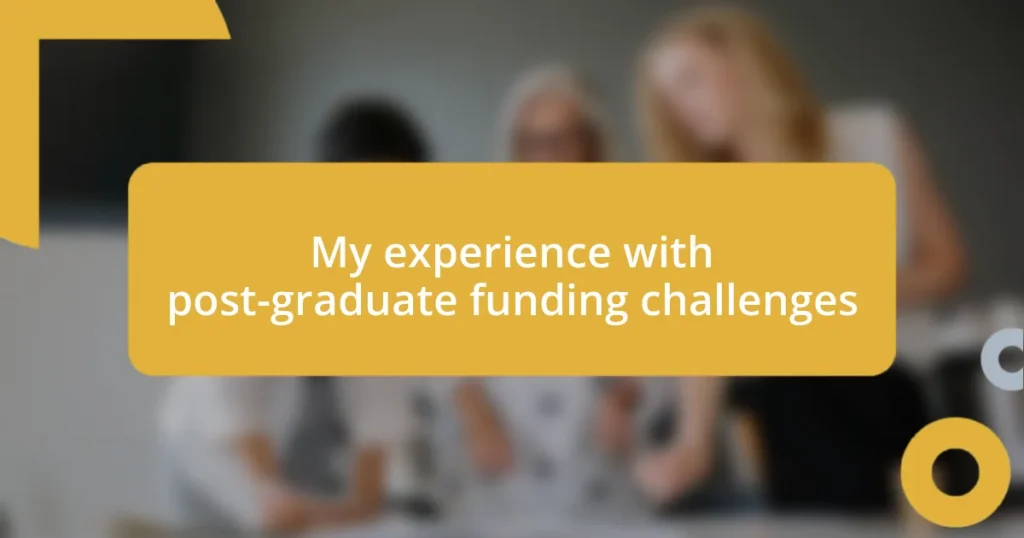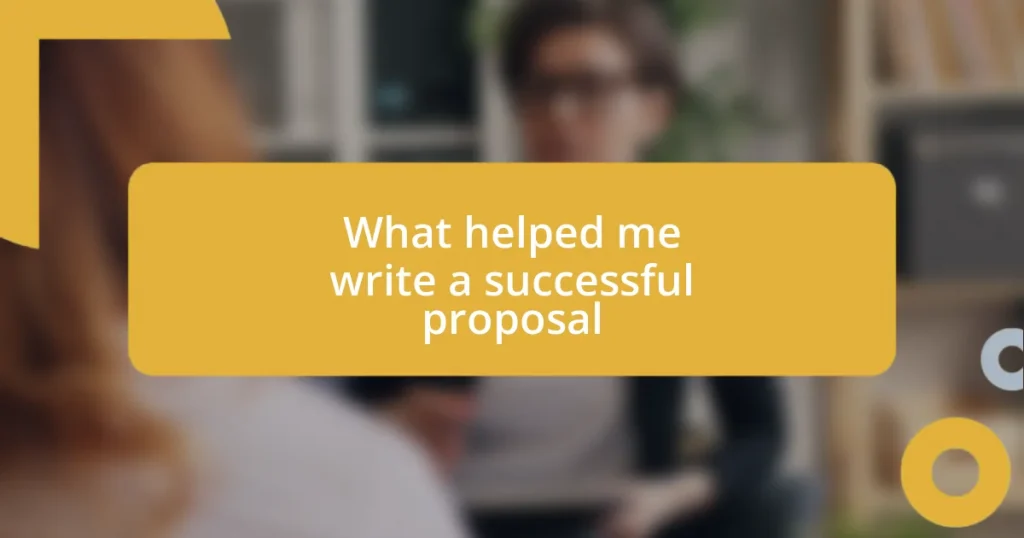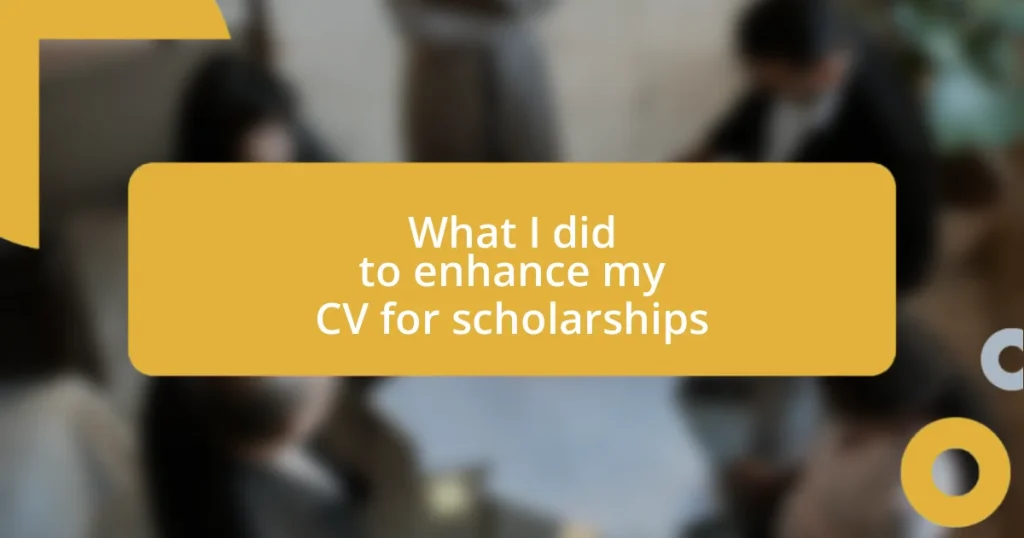Key takeaways:
- Identifying the right funding sources can be challenging due to diverse eligibility criteria, competition, and limited awareness of opportunities.
- Networking, breaking down tasks, and attending workshops greatly enhance the chances of finding and securing funding.
- Effective financial management, including budgeting and part-time work, is crucial for navigating the challenges of post-graduate studies.
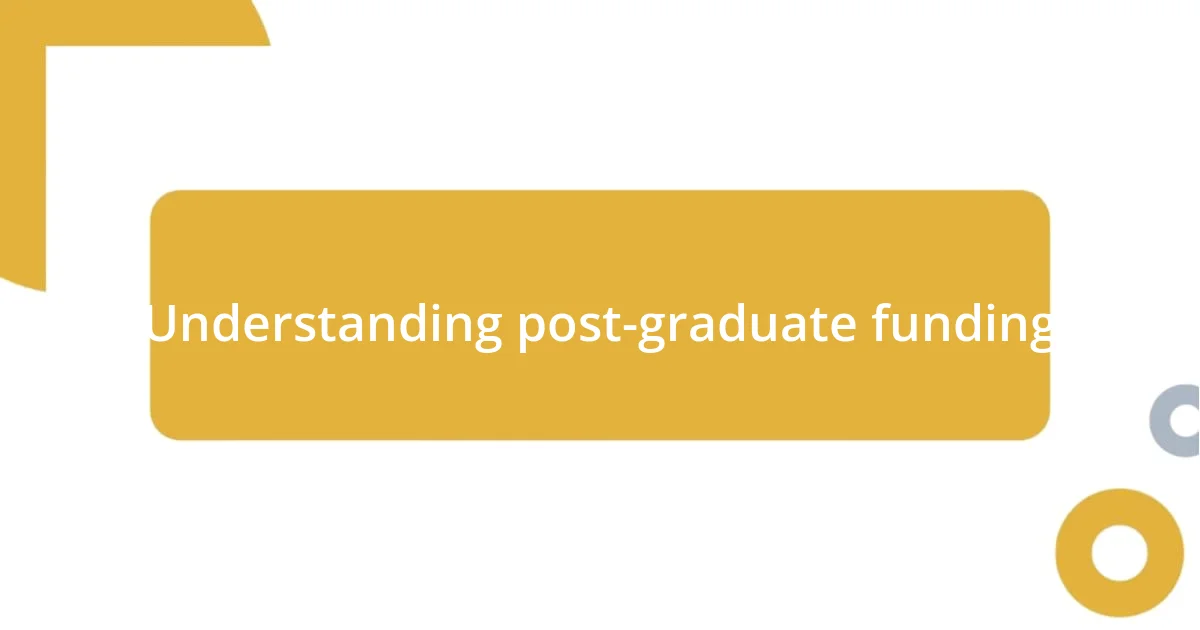
Understanding post-graduate funding
Post-graduate funding can often feel like a maze filled with confusing paths and dead ends. I remember the anxiety I faced sorting through endless scholarship applications, each with different eligibility criteria. It’s easy to feel overwhelmed when the stakes are so high—after all, investing in further education can lead to significant debt.
Understanding the types of funding available is crucial. From scholarships to assistantships, each option comes with its own set of advantages and challenges. I vividly recall the day I was offered a research assistantship. It was a relief, yet it also meant I had to balance my studies with a demanding job. Isn’t it interesting how often we seek one solution, only to find ourselves juggling multiple responsibilities?
I often reflect on the emotional rollercoaster that accompanies funding applications. The thrill of hope when submitting an application can swiftly turn into despair upon receiving a rejection letter. How did I cope? I learned to view each rejection not as a personal failure but as a stepping stone towards finding the right opportunity for me—a lesson that deepened my resilience and understanding of the funding landscape.
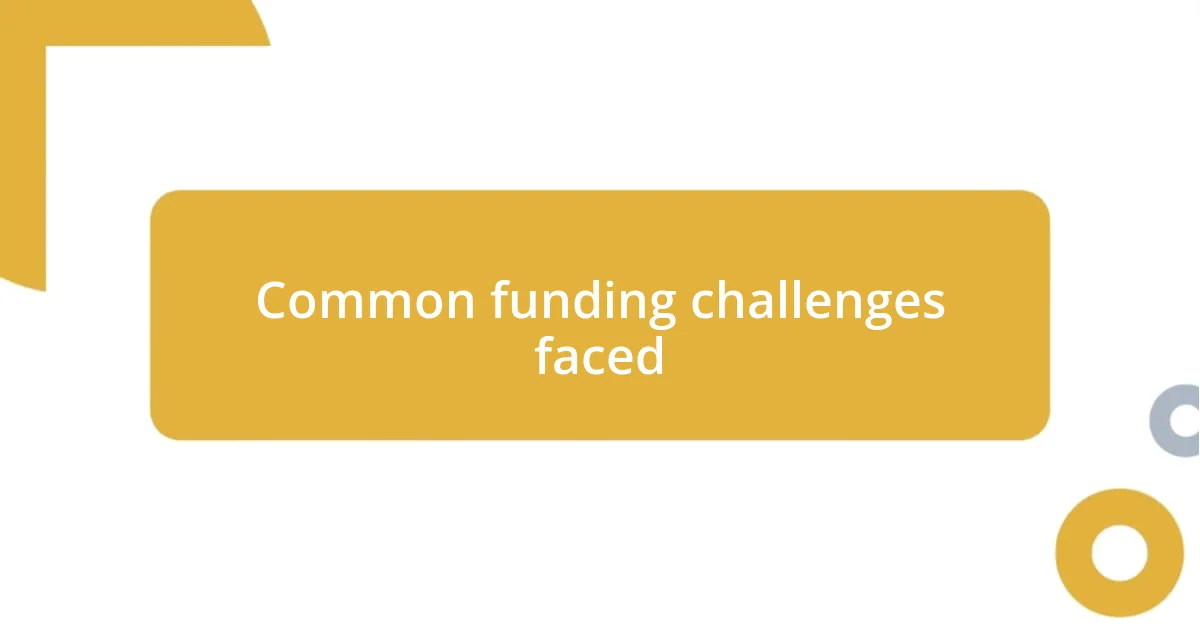
Common funding challenges faced
One of the most common challenges I encountered during my post-graduate journey was identifying the right funding sources. I often felt like I was chasing shadows—some scholarships seemed perfect but were either unavailable to my program or required a lengthy application process that I simply didn’t have time for. This confusion often left me disheartened, wondering if I would ever find the right fit.
Here are a few key challenges that many face:
- Diverse eligibility criteria: Each funding opportunity can have vastly different requirements, making it challenging to find ones I was eligible for.
- Intense competition: With so many applicants vying for limited resources, standing out became critical yet daunting.
- Limited awareness: I found that many potential funding sources were just not widely advertised, leaving me to rely heavily on word of mouth and online searches.
Another hurdle I faced was managing my finances effectively. I vividly recall the moment I had to create a detailed budget that outlined not just tuition but also living expenses, books, and materials. It felt overwhelming, as I often found myself at the mercy of fluctuating costs. Wrestling with my finances taught me the importance of meticulous planning and the necessity of keeping a close eye on every penny spent.
Consider these financial management challenges:
- Unpredictable costs: Unexpected expenses, like medical bills or equipment needs, can throw a wrench in my carefully laid plans.
- Understanding debt: The weight of potential student loans loomed over me, forcing me to rethink my spending habits.
- Time management: Balancing time between studying, working, and tracking finances was often a juggling act that tested my limits.
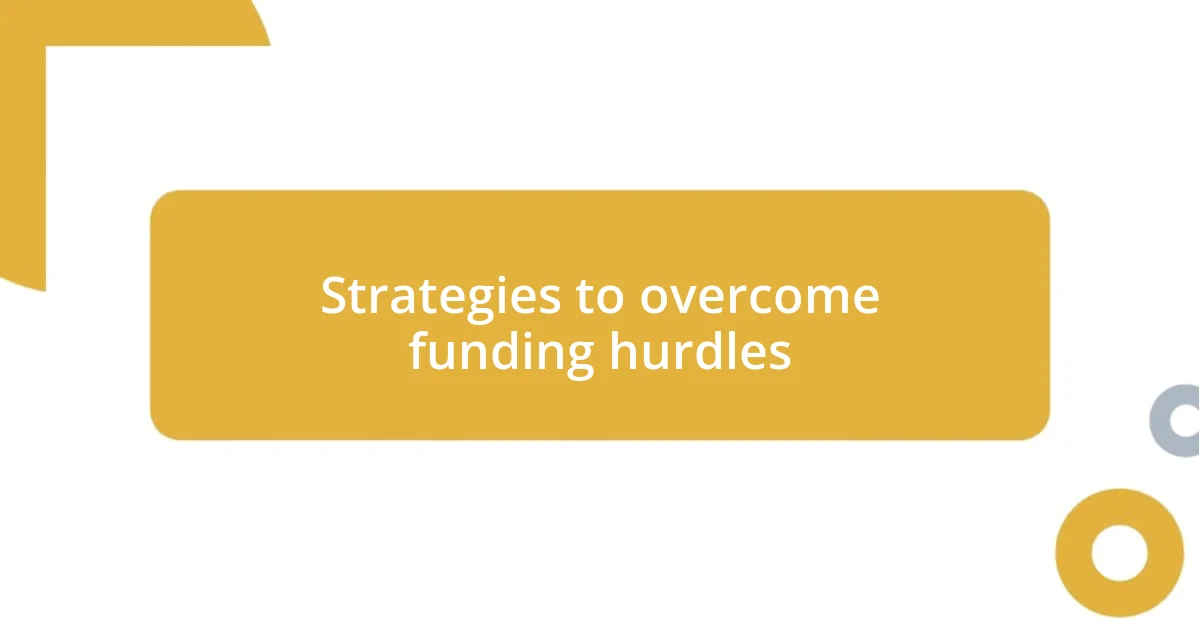
Strategies to overcome funding hurdles
When I faced funding hurdles, one key strategy that became invaluable was networking. I learned that connecting with peers, faculty, and professionals in my field opened up unexpected opportunities. For instance, a casual conversation during a departmental seminar led me to a little-known scholarship created specifically for students in my program. It’s fascinating how quickly things can change when you’re willing to engage genuinely with those around you.
Another effective approach was to break down the overwhelming process into smaller, manageable tasks. I set aside specific times each week dedicated to researching funding sources, completing applications, and reaching out to potential mentors. This method not only made the journey less daunting but also allowed me to celebrate small wins along the way. In hindsight, I realized that each application submitted—and even each rejection—was a lesson learned that contributed to my growth.
Moreover, I discovered the power of attending workshops and webinars focusing on funding guidance. Participating in these events provided me with not only valuable insights into funding sources but also tips on writing effective applications. There was one workshop where I met someone who had successfully navigated similar challenges. Their guidance was instrumental in refining my approach, helping me present my qualifications in the best light possible. Looking back, I believe that continuous learning proved to be a game-changer in overcoming funding barriers.
| Strategies | Description |
|---|---|
| Networking | Connecting with peers and professionals to discover hidden funding opportunities. |
| Task Breakdown | Dividing the funding process into smaller tasks to make it manageable and less intimidating. |
| Workshops/Webinars | Participating in events to gain insights and tips from others who have faced similar challenges. |
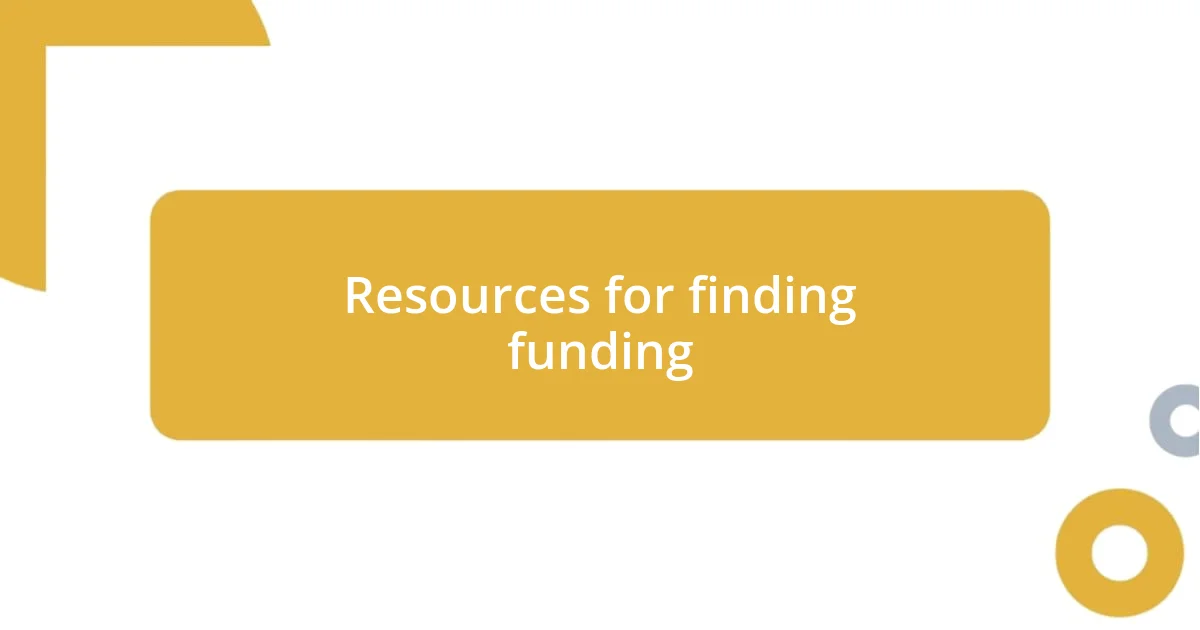
Resources for finding funding
To find funding, I leaned heavily on university resources, which proved to be invaluable. Many institutions have dedicated offices or online portals that list scholarships, grants, and assistantships tailored to specific programs. I vividly remember stumbling upon a funding database that changed everything for me—it felt like striking gold in a seemingly endless search.
Networking, as I’ve mentioned before, played a significant role in my journey, but I also discovered online platforms tailored specifically for funding opportunities. Websites like Fastweb and ScholarshipPortal became my go-to hubs for finding scholarships I wouldn’t have known about otherwise. These resources helped me navigate the maze of funding options, eliminating hours of scouring through endless lists.
Moreover, social media groups focused on academic funding can be a treasure trove of information. I joined several Facebook groups where current and former students shared their experiences and tips. One post about a lesser-known fellowship led me to apply and, ultimately, secure funding that I hadn’t initially thought was possible. Reflecting on this, I often wonder: How many golden opportunities might others miss simply because they aren’t tapping into these rich resources?
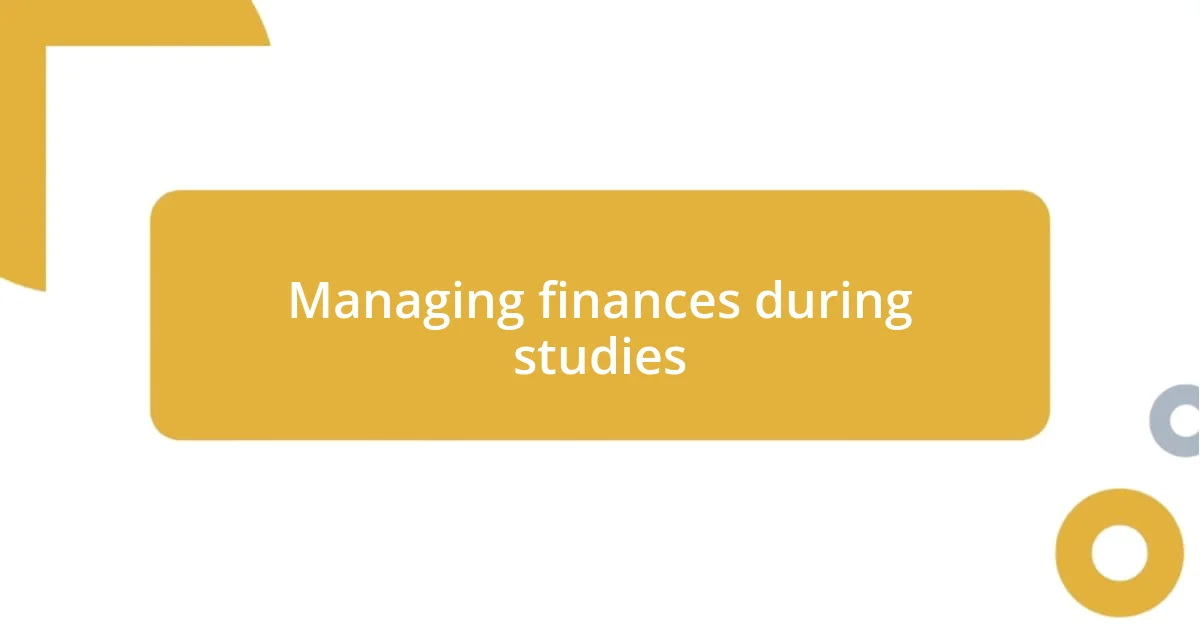
Managing finances during studies
Managing finances during my studies was a delicate balancing act, to say the least. I quickly discovered that budgeting became my best friend. By tracking my expenses meticulously, I gained clarity on where my money was going. Each month, I would sit down and review my spending habits, which often revealed surprising patterns—like those coffee runs that added up to a significant sum. Have you ever realized how little things can quietly drain your resources?
Another tactic that worked wonders was embracing a frugal lifestyle. I became more resourceful with meals, opting for bulk cooking and exploring campus resources for free events. I remember a particularly stressful week when I attended a free seminar on personal finance management. Not only did I learn helpful tips about managing my money, but I also enjoyed a delicious lunch they provided. That combined experience of budgeting and participating in campus life really illuminated my financial path.
Additionally, seeking part-time work was crucial. I found a research assistant position that not only helped offset my living expenses but also enriched my academic experience. It’s incredible how the right job can enhance both your resume and your bank account. I often reflect on how the challenges of managing finances taught me invaluable life skills. Have you ever faced a similar situation where financial challenges led to unexpected growth?
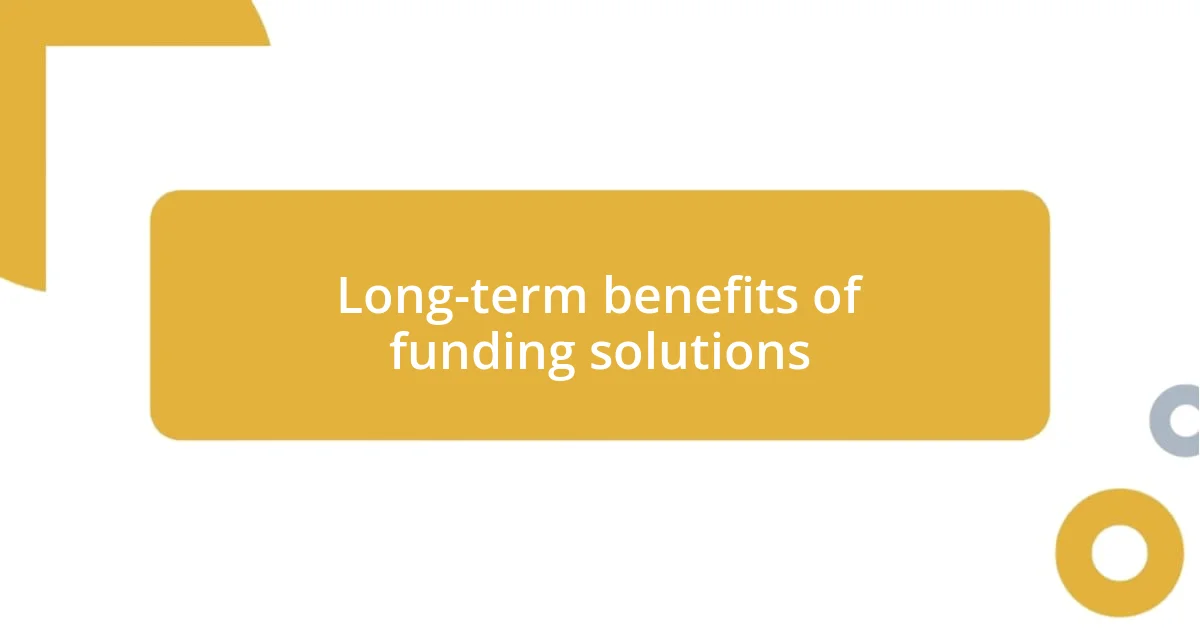
Long-term benefits of funding solutions
Navigating funding solutions during my post-graduate journey was like planting seeds for future growth. I remember feeling that tension in my chest as I faced mounting pressures; however, securing that fellowship not only alleviated my immediate financial burdens but created opportunities for research and collaborations that would mold my career for years to come. Have you ever experienced a ripple effect where one decision unlocked a series of favorable outcomes?
The long-term benefits of finding the right funding extend beyond monetary comfort. When I received a scholarship, it allowed me to focus on my coursework without the gnawing anxiety of financial stress. That mental clarity led to improved performance and ultimately set the stage for successful grant applications in my field. I often ponder: how much more could we achieve if funding solutions enable us to concentrate on what truly matters?
Moreover, these funding experiences fostered connections with mentors and peers that I still cherish today. I vividly recall attending conferences where I met scholars whose work inspired me to push my boundaries. The relationships built through this network could be a game-changer in opening doors for future collaborations. Have you considered how your funding journey might shape your professional network and open avenues you never anticipated?










